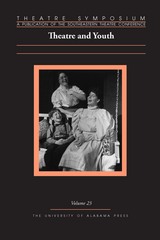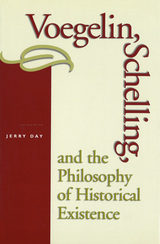2 books by Day, Jerry

Theatre Symposium, Vol. 23
Theatre and Youth
David S. Thompson
University of Alabama Press, 2015
The curtain rises on Theatre and Youth, volume 23 of Theatre Symposium with keynote reflections by Suzan Zeder, the distinguished playwright of theatre for youth, and presents eleven original essays about theatre’s reflections of youth and the role of young people in making and performing theatre.
The first set of essays draws from robustly diverse sources: the work of Frank Wedekind in nineteenth-century Germany, Peter Pan’s several stage incarnations, Evgeny Shvarts’s antitotalitarian plays in Soviet Russia, and Christopher Marlowe’s Dido, Queen of Carthage, whose depictions of childhood comment on both the classical period as well as Marlowe’s own Elizabethan age.
The second part of the collection explores and illustrates how youth participate in theatre, the cognitive benefits youth reap from theatre practice, and the ameliorating power of theatre to help at-risk youth. These essays show fascinating and valuable case studies of, for example, theatre employed in geography curricula to strengthen spatial thinking, theatre as an antidote to youth delinquency, and theatre teaching Latinos in the south strategies for coping in a multilingual world.
Rounding out this exemplary collection are a pair of essays that survey the state of the art, the significance of theatre-for-youth programming choices, and the shifting attitudes young Americans are bringing to the discipline. Eclectic and vital, this expertly curated collection will be of interest to educators and theatre professionals alike.
The first set of essays draws from robustly diverse sources: the work of Frank Wedekind in nineteenth-century Germany, Peter Pan’s several stage incarnations, Evgeny Shvarts’s antitotalitarian plays in Soviet Russia, and Christopher Marlowe’s Dido, Queen of Carthage, whose depictions of childhood comment on both the classical period as well as Marlowe’s own Elizabethan age.
The second part of the collection explores and illustrates how youth participate in theatre, the cognitive benefits youth reap from theatre practice, and the ameliorating power of theatre to help at-risk youth. These essays show fascinating and valuable case studies of, for example, theatre employed in geography curricula to strengthen spatial thinking, theatre as an antidote to youth delinquency, and theatre teaching Latinos in the south strategies for coping in a multilingual world.
Rounding out this exemplary collection are a pair of essays that survey the state of the art, the significance of theatre-for-youth programming choices, and the shifting attitudes young Americans are bringing to the discipline. Eclectic and vital, this expertly curated collection will be of interest to educators and theatre professionals alike.
[more]

Voegelin, Schelling, and the Philosophy of Historical Existence
Jerry Day
University of Missouri Press, 2003
In this important new work, Jerry Day brings to light the need for an extensive reinterpretation of the mature philosophy of Eric Voegelin, based on Voegelin’s published and unpublished appreciation for nineteenth-century German philosopher F. W. J. Schelling.
Schelling, whom Day maintains was one of the most important guides to Voegelin’s mature philosophy of consciousness and historiography, has been described as the father of several disparate movements and schools of continental philosophy—chief among them being “Hegelian” idealism and existentialism. This characterization implies that Schelling was a scattered thinker with little or no appreciation for philosophy as a disciplined inquiry into the nature of human affairs.
Voegelin was critical of this portrayal of Schelling. He argued that it lacked proper sensitivity for the impressive extent to which this giant of continental thought was able to rise above the “creed communities” of his time and recover the abiding concern of mature philosophers everywhere: the philosophia perennis. Those who claim that Schelling was scattered have failed, according to Voegelin, to appreciate the nonideological breadth of this great philosopher, misled by the splinter movements and schools that arose from mere fragments of his thought. In truth, Schelling founded no school and launched no movement. Instead, he reasoned with the disciplined integrity and wonder of a “spiritual realist.”
Day argues that Voegelin was a fine interpreter of Schelling, particularly during the decisive years when the central orientation of Voegelin’s mature thought was beginning to take hold—between the writing of his History of Political Ideas and its eventual transformation into Order and History. Day gathers an impressive array of evidence to interpret Voegelin’s little-known support for Schelling’s achievements, while offering detailed analyses and helpful summaries of a vast body of literature that has yet to be translated into English.
Day’s partial agreement with Voegelin’s uncommon assessment of Schelling provides him with the point of departure that leads to one of this book’s most distinctive contributions to contemporary thought. It has the rare ability to help clear the way for philosophical realists to make peace with many of their contemporaries, giving them further grounds for accepting the strongest anthropological and psychological insights of recent continental philosophy, while helping them to avoid its tendencies toward nihilistic despair or fideistic historicism.
By reading each philosopher through the eyes of the other, Day provides an analysis that will be illuminating for Voegelin scholars and Schelling scholars alike. The book will also appeal to readers with more general interests in the history and development of continental philosophy, political theory, and comparative religion over the past century.
[more]
READERS
Browse our collection.
PUBLISHERS
See BiblioVault's publisher services.
STUDENT SERVICES
Files for college accessibility offices.
UChicago Accessibility Resources
home | accessibility | search | about | contact us
BiblioVault ® 2001 - 2024
The University of Chicago Press









